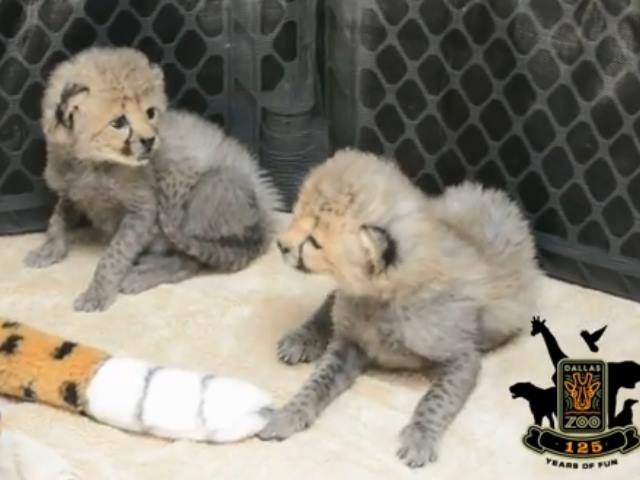
Two eight-week old male cheetahs are about to start their new life at the Dallas Zoo with an unusual cage mate - An eight-week-old male black Labrador Retriever puppy named Amani.
Winspear and Kamau who weigh a mere 8lbs and 6lbs respectively were born at the Smithsonian Conservation Biology Institute in Front Royal, VA. After spending two weeks under the careful observation of experts, they were deemed fit to start their lives at the zoo.
However, when the two got there, they were surprised to be greeted by an equally cute roommate! Little Amani whose name means 'peace' in Swahili has been placed there because experts believe that he will not only be a good playmate for the wild cats but also, provide a calming influence on the naturally aggressive animals. That's because dogs, especially Labradors are very comfortable in public settings and seeing Amani's calm demeanor around the thousands of visitors that are bound to flock to the zoo to see the cuties, may help the cheetahs realize that the humans pose no threat to them.

This is going to be especially important in the case of these two because they are going to be part of the zoo's Animal Adventure Outreach Program to help teach the public about their highly endangered species. As to whether the strategy will work and if the unusual companions will get along and continue being mates when Winspear and Kamau are over 3 feet tall at the shoulder and weigh a hefty 140 lbs, is anybody's guess. But for now, the three babies seem to be getting along just fine.
Cheetahs, who get their name from the Hindi word 'Chita,' which means 'spotted one' are the world's fastest land animals capable of reaching speeds of up to 70 mph. Oddly enough, these gorgeous cats are not considered part of the elite group of 'Big Cats' that include the lion, tiger, jaguar and leopard because they lack the ability to roar! While these aerodynamic cats once roamed the open grasslands, savannas, dense vegetation, and sometimes even mountainous terrains of Africa, the Arab Peninsula and Asia in large numbers, they are now on the brink of extinction, especially in Asia where they were hunted down ruthlessly for their beautiful skin.
The cats still living in the wild, face numerous challenges ranging from loss of habitat to conflict with humans, as well as the fact, that they are not the strongest of animals and are often unable to fend their cubs falling prey to the more aggressive lions, jackals, and hyenas. With only between 15,000 to 25,000 believed to be left in the wild, conservation programs such as the one Winspear and Kamau are part of, are becoming increasingly crucial for the animal's survival.
Resources: dailymail.co.uk,news.yahoo.com,cheetah.org,bigcatrescue.org